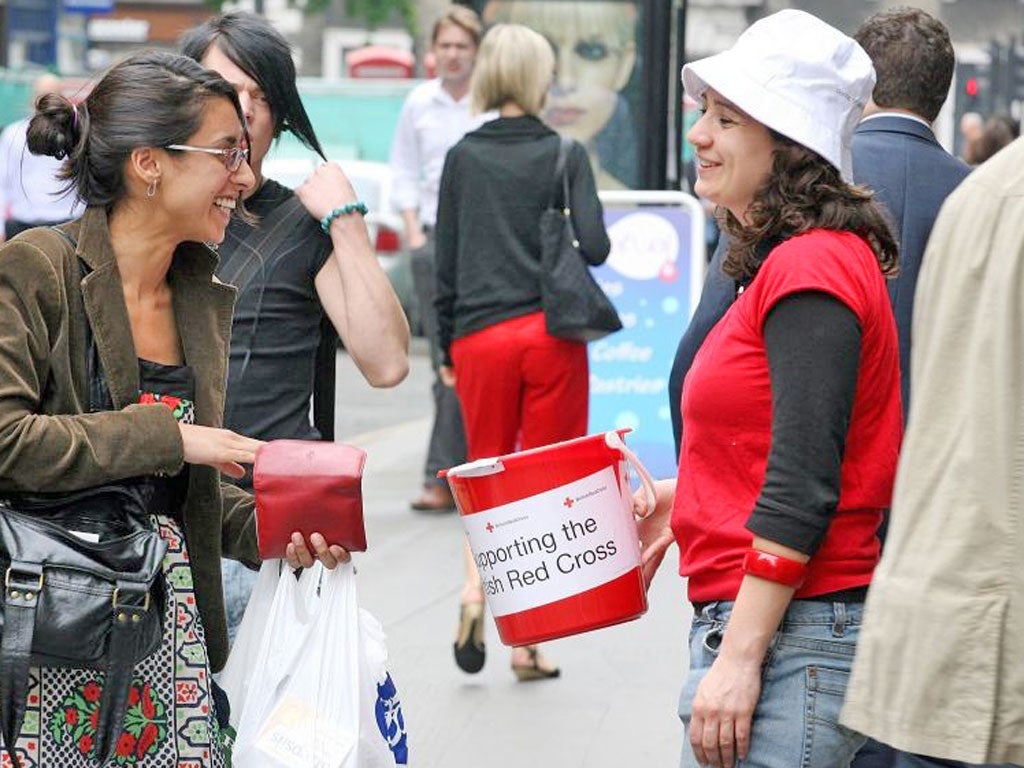Tough new rules and fines to crack down on charity 'chuggers'
Fears raised over funding, but henpecked shoppers should be given a break

Your support helps us to tell the story
From reproductive rights to climate change to Big Tech, The Independent is on the ground when the story is developing. Whether it's investigating the financials of Elon Musk's pro-Trump PAC or producing our latest documentary, 'The A Word', which shines a light on the American women fighting for reproductive rights, we know how important it is to parse out the facts from the messaging.
At such a critical moment in US history, we need reporters on the ground. Your donation allows us to keep sending journalists to speak to both sides of the story.
The Independent is trusted by Americans across the entire political spectrum. And unlike many other quality news outlets, we choose not to lock Americans out of our reporting and analysis with paywalls. We believe quality journalism should be available to everyone, paid for by those who can afford it.
Your support makes all the difference.They have become a feature of Britain's high streets, but they could find themselves marginalised from now on. New rules which bar so-called "chuggers" – the charity street collectors – from standing near shop entrances, among other restrictions, came into force yesterday.
The change will doubtless be popular with the hen-pecked shoppers who routinely have to cross the road to avoid "charity muggers", but others will argue that a valuable source of funding for charities could be choked by the new rules.
Some techniques, including following people down the street and pretending someone has dropped something – revealed earlier this year as a tactic to snag potential donors while forcing them to stop in the street – has seen the popularity of so-called chuggers plummet ever lower. An investigation by the Sunday Telegraph recently found that a number of street fundraisers trained by the firm Tag Campaigns were not being told they must disclose that they are paid, while footage showed staff following people down the street despite their insistences they were not interested.
The new rules, developed by the Public Fundraising Regulatory Association, mean that fundraisers are no longer allowed stand within three metres of a shop doorway, pedestrian crossing, cashpoint or train and bus station entrances; effectively barring them from most high streets. Nor can they approach members of the public deemed to be "on-duty", banning them from approaching anyone who might be working. They are also barred from working on sites booked by other fundraisers. Moreover, fundraisers have been told they must be open about how much their firm is paid to carry out the work and should now submit the wording of that to the Public Fundraising Regulatory Association (PFRA). They should also carry information about the sites they work on.
The existing rules were also amended so that chuggers cannot follow someone down the street for more than three steps. Each transgression incurs a set number of penalty points for the organisation. After a minimum threshold of 1,000 penalty points is reached, the organisation is fined at a rate of £1-per-point.
Max (not his real name), a 33-year-old fundraiser in central London, said the new regulations were a sign of the PFRA attempting to "phase out street fundraising, because we're not exactly the most popular people". He added his belief that in-house charitable organisations would be hardest hit if they breached the rules, while large-scale agencies can allow for financial penalties because they have greater economic resources.
But Kate (not her real name), a 23-year-old fundraiser, said some of the rules would be adapted on the ground. Referring to the new, stricter regulations on disallowing those who are "unable to give their consent" from donating, she said: "They are altered once we start trying to talk to people, it's very much down to you to figure out if someone is capable of donating."
The tighter rules were welcomed by the Institute for Fundraising. In a statement, the institute's chief executive Peter Lewis said: "We are unified in our mission to maintain public trust in charities so that fundraisers can continue to raise much needed funds for the good causes they support."
Join our commenting forum
Join thought-provoking conversations, follow other Independent readers and see their replies
Comments